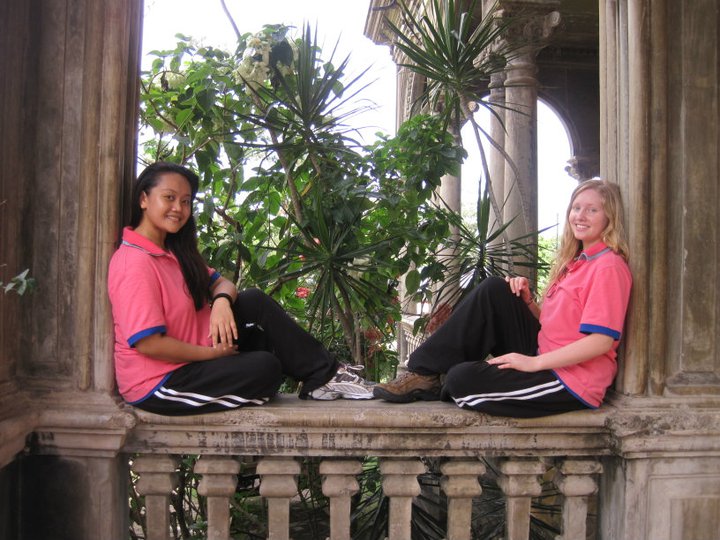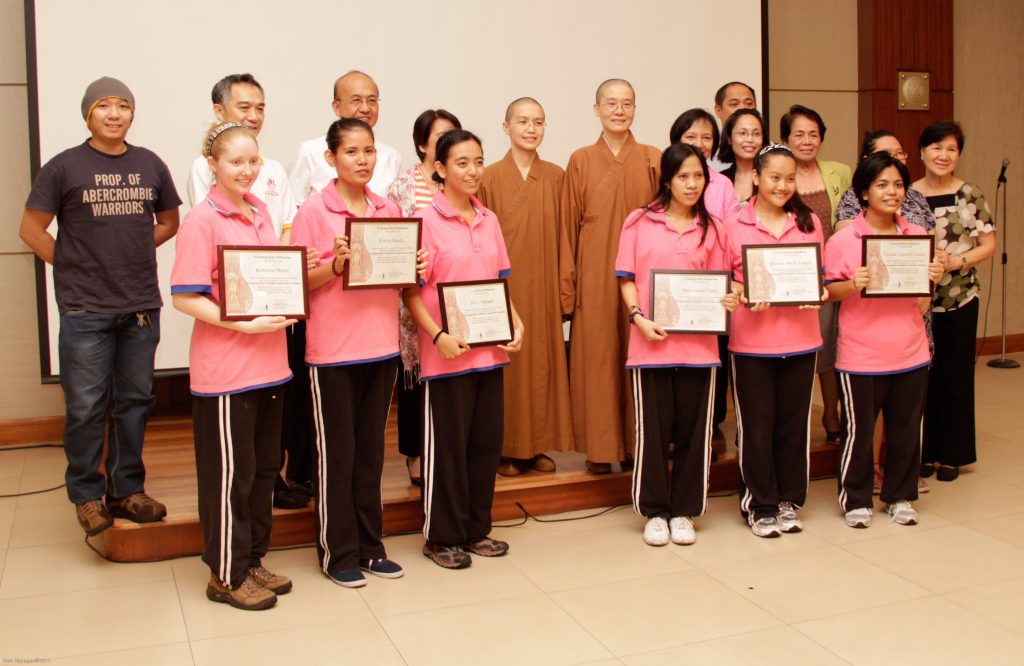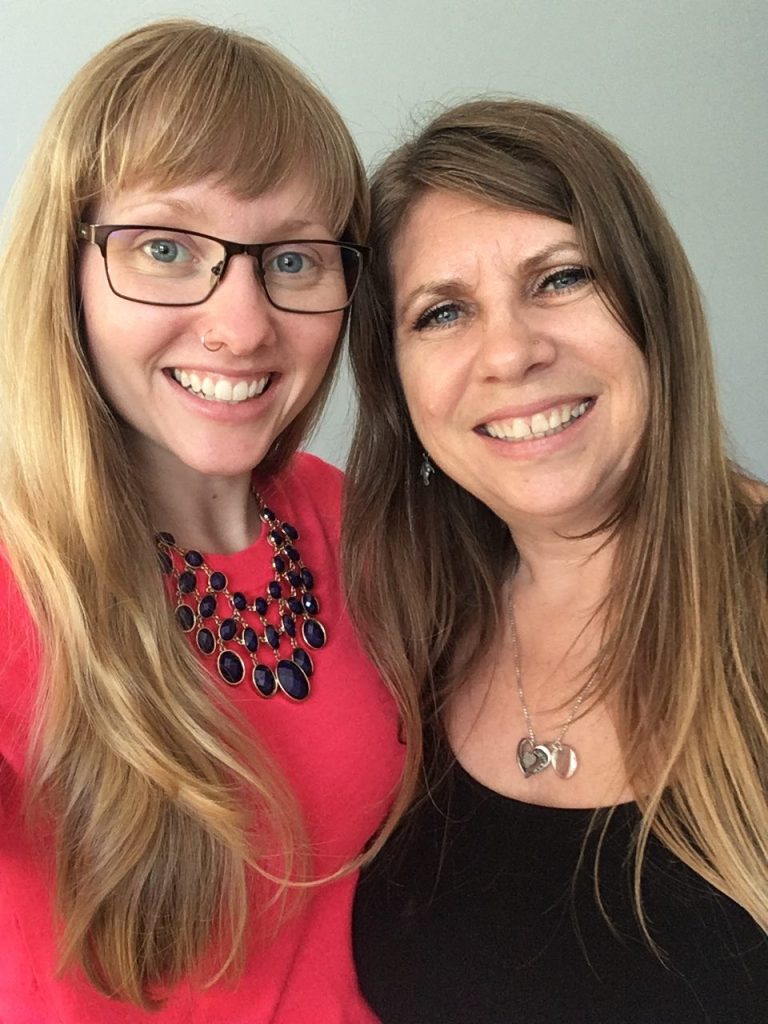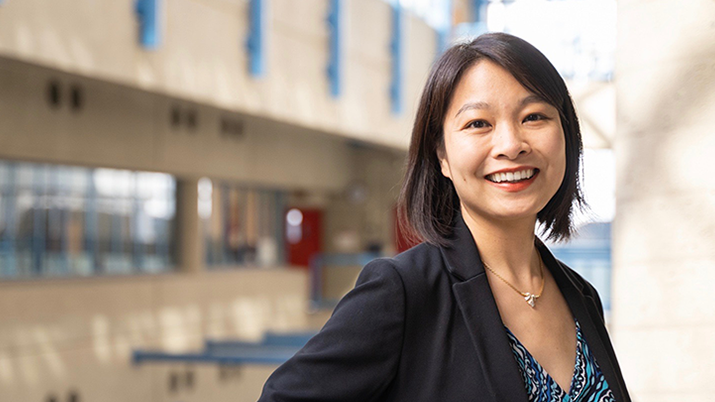

Katherine Moore. Photo: Madeleine de Trenqualye/UBC Faculty of Arts
Katherine Moore never thought university was an option for her.
Growing up in Sudbury, Ont., Moore had a difficult childhood, witnessing substance abuse, domestic violence and sexual abuse from a young age. In high school, she said she didn’t do well, routinely skipping classes and landing herself in detention.
“I was the ‘bad kid’ at school, and when you are labelled that, you start internalizing all of those ideas about yourself,” she said. “It wasn’t my parents’ fault because they didn’t have post-secondary education either. An element of it was intergenerational—my mom barely finished high school and she experienced a lot of abuse in her childhood, too.”
Yet on Friday, Moore’s parents will see just how far she has come when they watch from the audience as she crosses the stage to accept her bachelor’s degree in psychology and delivers her class’s graduation speech.
That Moore is on her way to becoming a psychologist is not surprising. Her journey to reach this point, however, was not without challenges.
Growing up, Moore said she always enjoyed helping friends deal with their interpersonal problems and toyed with the idea of pursuing a career in the field of mental health. With university seemingly out of her reach, however, she pursued a career in physical health instead.
Working as a personal trainer, Moore said she still struggled to deal with the trauma she experienced growing up and wasn’t satisfied with the direction her life was taking. She spent a year saving up her paycheques until she could afford to quit her job, leaving Sudbury to embark on a year of travel.


Credit: Katherine Moore
After visiting 23 countries throughout Europe and Asia, Moore ended her trip living for four months in a Buddhist monastery. Moore’s interest in meditation, which she had relied on since the age of 14 to cope with stress at home, led her to consider becoming a monk.
Moore embraced the rigid repetitiveness of monkhood, enjoying the strict schedule of waking at dawn to chant and meditate, followed by silent meals, classes to learn Buddhist texts, cleaning, more meditation, and eventually sleep—all to be repeated again the next day.
After four months, however, Moore said she felt deep pangs of homesickness.
“After not talking to my family and friends for four months, I felt like I really missed people for the first time in my life— and it was a wonderful feeling,” she said. “The trauma that I had experienced in my childhood had totally disconnected me from society. It felt really good to miss people and to want to go home.”


Credit: Katherine Moore
She returned to Canada and decided to pursue her dream of becoming a psychologist specializing in family counselling.
“I came to the realization that I can never go back in the past to change my circumstances,” she said. “But what I can do is empower myself and try to do as much as I can to prevent other children from going through the same experience I did.”
After applying to universities across the country, Moore was accepted into the psychology program at Carleton University in Ottawa, where she studied for a year before transferring to UBC.
Shock quickly set in that UBC would be vastly different from her initial university experience. Moore said she felt incredibly overwhelmed and unprepared for the academic rigours of UBC.
“Growing up, nobody really encouraged me to read, so coming to UBC, my reading skills were really poor,” she recalled. “My classmates would talk about Ernest Hemingway, and I had no idea who that was.”
In her first few months, Moore, who has a generalized anxiety disorder, said she came close to having a nervous breakdown. Eventually, however, she made a conscious decision to do everything in her power to improve her situation.
If she encountered a word she didn’t understand, Moore would look it up. She started meeting her professors after class to ask questions about course material, and became a regular at UBC’s centre for writing and scholarly communication to learn how to improve her writing and research skills.
By her third year, Moore said she felt she had a strong enough grasp of academics to pursue extracurricular activities in her fields of interest. She started volunteering with non-profit groups that support at-risk youth and provide mental health and family support services, and now sits on the steering committee of First Call: BC Child and Youth Advocacy Coalition.
While working as a research assistant for several psychology professors, Moore co-authored academic papers about student wellbeing, and helped develop a handbook for mentors on how to support at-risk youth.
She also started working with the Canadian Mental Health Association, helping build a provincial network of students aimed at changing campus mental health culture.
This year, Moore’s persistence paid off when she received the Wesbrook Scholar award—one of the most prestigious awards for undergraduate students at UBC—and the Outstanding Leadership in the UBC Community and Beyond Award from the faculty of arts.
After graduation, Moore plans on pursuing a master’s degree in counselling psychology at UBC. While she still hopes to work as a counsellor helping families and at-risk youth, she also hopes to dedicate part of her career to social development to address the root causes of domestic violence and child abuse.


Katherine and her mother, Sheryl Sandford. Credit: Katherine Moore
Reflecting on her journey so far, Moore said she feels immense pride to finally graduate on Friday. That pride will be shared with her mother, Sheryl Sandford.
Inspired by her daughter’s success at UBC, Sandford secretly enrolled in an office specialist program at Eastern Florida State College, finishing the program with a perfect GPA earlier this month.
“I’m so proud of my mom,” said Moore. “It takes guts to go back to school at 55.”
If Moore could give advice to her 17-year-old self who felt she was “worthless” and not university material, she said she would have just one message:
“I would try my best to convey that you are valuable,” she said. “That you are capable of learning things, and that you have the power and strength within you to contribute something important to society. You just have to go and do it.
“You are worth it.”
This article was originally published by UBC News. Read the original article.


